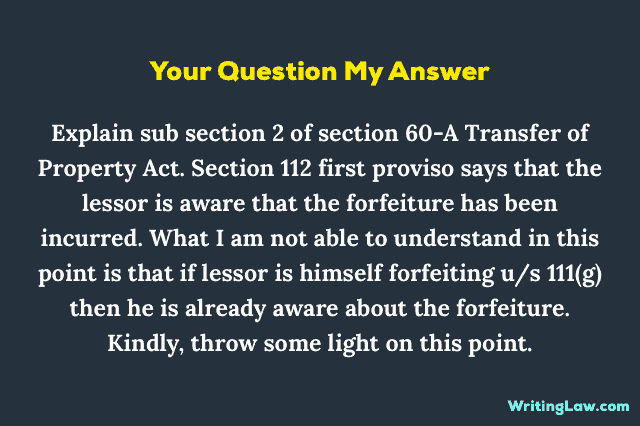 Question asked by a Law Student:-
Question asked by a Law Student:-
Explain sub section 2 of section 60-A Transfer of Property Act. Section 112 first proviso says that the lessor is aware that the forfeiture has been incurred. What I am not able to understand in this point is that if lessor is himself forfeiting u/s 111(g) then he is already aware about the forfeiture. Kindly, throw some light on this point.
Answer by WritingLaw:-
Section 60-A: A mortgagor is entitled for redemption after paying debt to mortgagee.
For example-
A is a mortgagor. He has taken amount of Rs. 50,000 from B and as a security he has mortgaged his immovable property (house) to B. Now if A has to transfer the concerned property to C, then he may direct B to transfer the property directly to C instead of transferring it to A.
Now clause 2 says-
To understand it clearly you need to know what is encumbrance. It is basically a claim or liability attached to the property. It can be in the form of mortgage, lien etc.
So this right belongs to mortgagor as well as encumbrancer but not intermediate encumbrance (which occurred earlier than other claims.) And the claim of encumbrance is preferred over mortgagor and that too of a prior encumbrancer are not the later ones.
As far as section 111 of Transfer of Property Act is concerned, it talks about determination of lease either by express conditions or implied conditions.
Clause (g) of section 111 gives right to lessor to forfeit the leased property if lessee-
● Breaks express condition.
● Lessee renounces his character.
● Lessee becomes insolvent.
In such case lessor can by giving notice to lessee express his intention to determine the lease.
But under section 112 lessor can waive his right of forfeiture by accepting rent but accepting rent after instituting suit for ejecting lessee is no waiver or by distress for rent which allows lessor to seize goods present at premises and use or retain them until rent arrears are paid or by any other way.
Proviso 1 under section 112 is designed or incorporated to prevent lessor from taking two positions because under section 111 (g) he is taking position of forfeitor and under section 112 he is showing intention to subsist the lease.
So if he chooses to receive the rent which can only happen when lease continues then he cannot say that he has elected forfeiture. The onus is upon lessee to prove knowledge of the lessor.
- Article 334A of the Constitution of India - 14th April 2024
- Article 332A of the Constitution of India - 14th April 2024
- Article 330A of the Constitution of India - 14th April 2024







